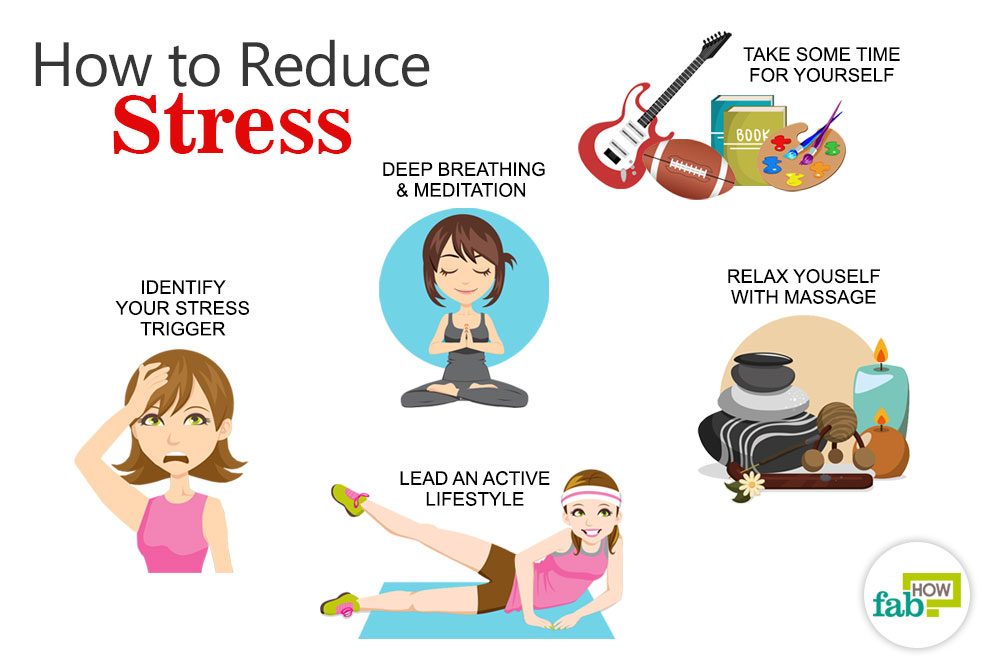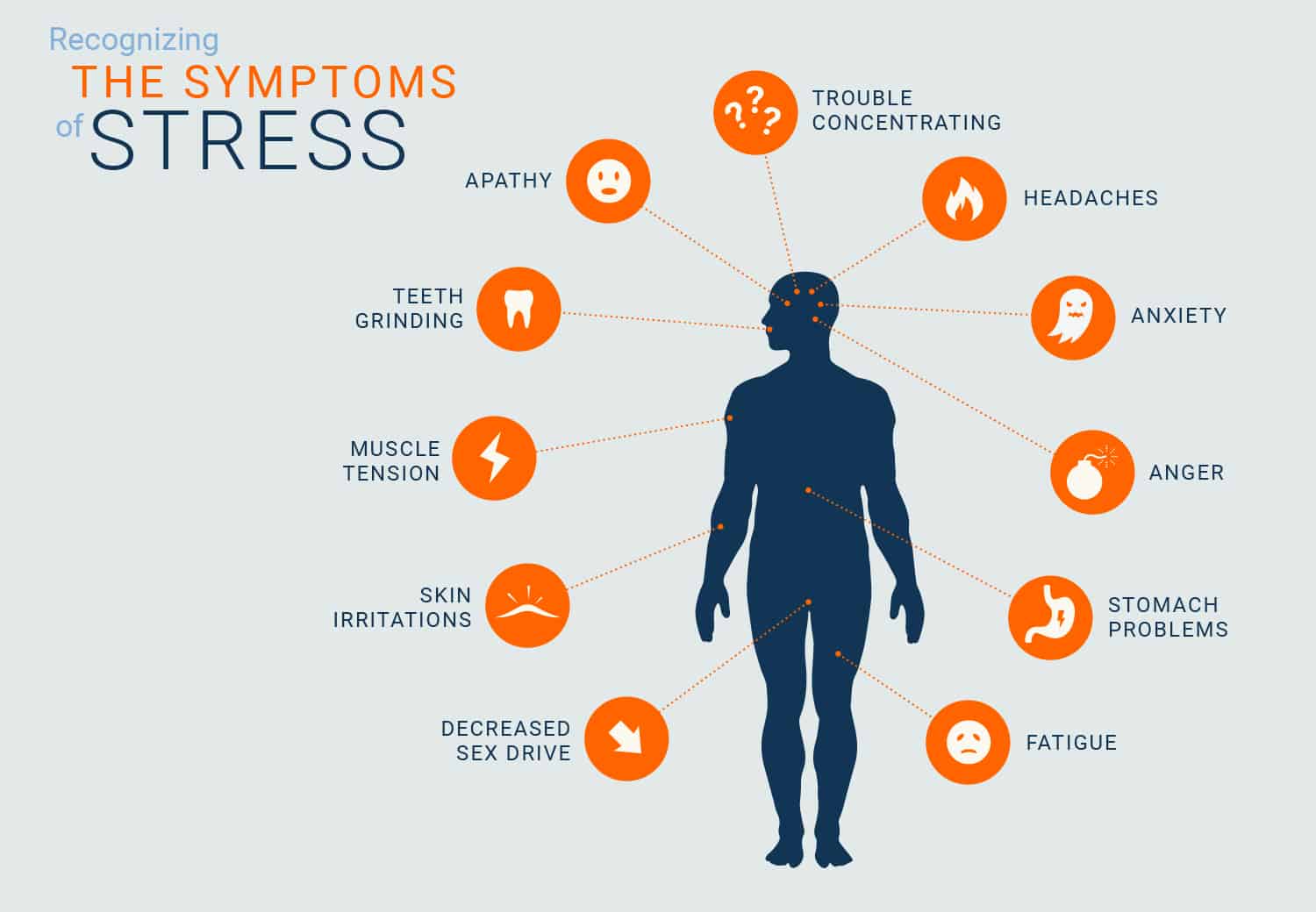Stress is a biological and psychological response experienced on encountering a threat which we feel we don’t have the resources to cope with. A stressor is a stimulus that causes stress, e.g. Exam, divorce, death of cherished one, moving house, loss of a job. Sudden and severe stress usually produces: Increase in heart rate – Increase in breathing – Decrease in digestive activity – Liver released glucose for energy – First of all, our body judges a situation and decides whether or not it’s stressful. This decision is made based on sensory input and processing and also on stored memories. In case the situation is judged as being stressful, the hypothalamus is activated.
Scientific Reasons: The hypothalamus in the brain is in charge of the stress response. When a stress response is triggered, it sends signals to two other structures: the pituitary gland and the adrenal medulla. These short term responses are produced by The Fight or Flight Response via the Sympathomedullary Pathway. The long term stress is regulated by the Hypothalamic Pituitary Adrenal system. The Hypothalamic Pituitary Adrenal System – The stressor activates the Hypothalamic-Pituitary Axis – The hypothalamus stimulates the pituitary gland – The pituitary gland secretes adrenocorticotropic hormone – ACTH stimulates the adrenal glands to produce the bodily hormone corticosteroid – Cortisol enables the body to maintain stable supplies of blood sugar – Adequate and steady levels of blood sugar help person to deal with prolonged stressor, and helps the body to get back to normalize – The adrenal cortex releases stress hormones called cortisol.
Stress Chemical: This has a number of functions including releasing stored glucose from the liver and controlling swelling after an injury. The immunity system is suppressed while this happens. Sympathomedullary Pathway – The hypothalamus also activates the adrenal medulla. The adrenal medulla is a part of the autonomic nervous system. The ANS is the portion of the peripheral nervous system that acts as a control system, maintaining homeostasis within the body. These activities are usually performed without conscious control. The adrenal medulla secretes the bodily hormone adrenaline. This bodily hormone gets the body ready for a fight or flight response. The physiological reaction includes increased heart rate.
Adrenaline leads to the excitement of the sympathetic nervous system and reduced activity in the parasympathetic nervous system. Adrenaline creates changes within the body like decreases and increases. After the threat is over the parasympathetic branch takes control and brings the body back into a balanced state. No ill effects are experienced from the short term response to stress and it further has survival value in an evolutionary context. Evaluation – Strengths – Measuring stress hormones provides an objective measure of stress. Fight response can be seen in all mammals in response to threats. Weakness – There’s considerable variation in level and type of hormones released by different people and in response to different stressors, not a simple physiological process. People without adrenal glands need hormonal supplements to survive stress. Symington found that conscious dying patients showed different stress reactions to unconscious ones.
Tips To Reduce Stress

You are not overreacting, and it isn’t just you. Anxiousness disorders are the most typical mental disorder in the US, impacting up to 18 percent of people. The great news is that a few simple changes in lifestyle, including changing up your diet, could mean the distinction between a good night’s rest and a sleepless night replaying your conversation with the teller at the bank. While all of us have occasional nervousness for a variety of numerous reasons, research suggests there might be value in some mindful eating strategies. Let’s have a look. Do not Miss: 7 Foods to help you destabilize – Diet Tips to Help Manage Anxiety – 1.
1. Eat Good Carbs –
Let us be sincere, you do not have to pay a therapist $200 an hour to tell you that carbohydrates make us happy. Studies suggest that eating a meal rich in carbohydrates triggers the entry of tryptophan to the brain, which increases our levels of the feel-good neurotransmitter, serotonin. But before you begin bingeing on chocolate chip cookies, bear in mind that the kind of carb matters. Lower glycemic index carbs are metabolized more slowly than refined carbs, helping us maintain a more even blood sugar level and creates a peaceful feeling of calm. And much like their impact on our satiety, experts believe that low-GI foods also have a longer lasting effect on brain chemistry, mood, and energy level.
So skip the refined pastry and sweets and load up on fiber-rich whole foods like quinoa, brown rice, yams, broccoli, and apples. Pack in Protein – We know how important protein is to build strong bodies, but what about helping us flex our happy muscles, too? Protein is composed of a wide range of amino acids, and it is these amino acids which are the building blocks of emotion-regulating neurotransmitters. For instance, serotonin is dependent on the amino acid tryptophan, while another happy neurotransmitter, dopamine, requires a healthful dose of the amino acid tyrosine. Emerging evidence suggests that an adequate supply of protein is vital for the maintenance of mental wellness.
Get your feel good fill by loading up on dairy, red meat, poultry, fish, seeds, nuts, avocados, and buckwheat.
2. Choose Omega-3 Fats – We know that omega-3
fats play a major part in physical brain health, so it isn’t surprising that they support us emotionally as well. While past research focused on the role of omega-3 in depression, emerging research suggests that getting plenty of those healthful fats might help reduce nervousness as well. Aim to add at least two servings of fatty fish like salmon, trout, and mackerel your week, and select omega-3 fortified eggs, flax and walnuts often.
Kick the Coffee Habit – If you are struggling with nervousness, you might wish to start ordering decaf.


